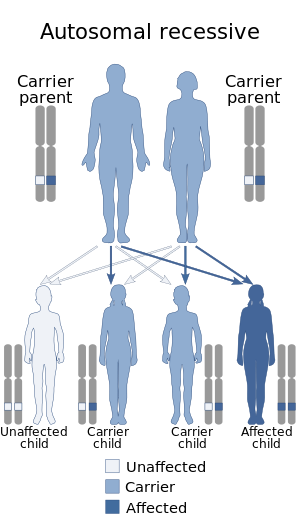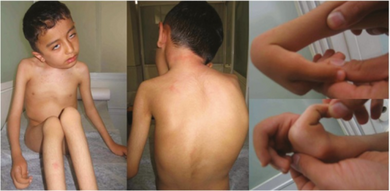Ullrich congenital muscular dystrophy
| Ullrich congenital muscular dystrophy | |
|---|---|
| Other names: Scleroatonic muscular dystrophy[1] | |
 | |
| Autosomal recessive pattern is the inheritance manner of this condition | |
| Symptoms | Muscle weakness[2] |
| Causes | Mutations in the COL6A1, COL6A2, and COL6A3 gene[3] |
| Diagnostic method | Physical exam, Medical history[3] |
| Medication | Physical therapy, Surgery(scoliosis)[3] |
Ullrich congenital muscular dystrophy is a form of congenital muscular dystrophy. It is associated with variants of type VI collagen, it is commonly associated with muscle weakness and respiratory problems, though cardiac issues are not associated with this type of CMD.[4][5] It is named after Otto Ullrich, who is also known for the Ullrich-Turner syndrome.[6]
Signs and symptoms

The presentation of Ullrich congenital muscular dystrophy in an affected individual is as follows:[2][7]
- Muscle weakness
- Difficulty walking
- Contractures (predominantly in proximal muscles, e.g. neck)
- Joint looseness (predominantly in distal joints)
Genetics
In terms of the genetics of Ullrich congenital muscular dystrophy, there are mutations in the genes COL6A1, COL6A2, and COL6A3. This sub-type of muscular dystrophy is autosomal recessive in nature.[1][8]
COL6A1 plays an important part in maintaining the human body's integrity of various tissues. Alpha 1 subunit of type VI collagen is the encoded protein.[9]
Diagnosis

In terms of the diagnosis of Ullrich congenital muscular dystrophy upon inspection follicular hyperkeratosis, may be a dermatological indicator, additionally also serum creatine kinase may be mildly above normal.[5] Other exams/methods to ascertain if the individual has Ullrich congenital muscular dystrophy are:[medical citation needed]
Differential diagnosis
This includes[10]
Treatment

Treatment for Ullrich congenital muscular dystrophy can consist of physical therapy and regular stretching to prevent and reduce contractures. Respiratory support may be needed at some point by the affected individual.[3]
Though cardiac complications are not a concern in this type of CMD, in regards to respiratory issues ventilation via a tracheostomy is a possibility in some cases.[5][11]
Prognosis
The prognosis of this sub-type of MD indicates that the affected individual may eventually have feeding difficulties. Surgery, at some point, might be an option for scoliosis.[3]
Scoliosis, which is a sideways curve of the persons vertebrate, is determined by a variety of factors, including the degree (mild or severe), in which case if possible a brace might be used by the individual.[12]
Research

In terms of possible research for Ullrich congenital muscular dystrophy one source indicates that cyclosporine A might be of benefit to individuals with this CMD type.[13]
According to a review by Bernardi, et al., cyclosporin A (CsA) used to treat collagen VI muscular dystrophies demonstrates a normalization of mitochondrial reaction to rotenone.[14]
See also
References
- ↑ 1.0 1.1 RESERVED, INSERM US14 -- ALL RIGHTS. "Orphanet: Congenital muscular dystrophy, Ullrich type". www.orpha.net. Archived from the original on 2016-06-03. Retrieved 2016-05-11.
- ↑ 2.0 2.1 Reference, Genetics Home. "collagen VI-related myopathy". Genetics Home Reference. Archived from the original on 2016-05-13. Retrieved 2016-05-11.
- ↑ 3.0 3.1 3.2 3.3 3.4 "Ullrich congenital muscular dystrophy | Disease | Treatment | Genetic and Rare Diseases Information Center (GARD) – an NCATS Program". rarediseases.info.nih.gov. Archived from the original on 2016-06-10. Retrieved 2016-05-11.
- ↑ "Ullrich congenital muscular dystrophy - Conditions - GTR - NCBI". www.ncbi.nlm.nih.gov. Archived from the original on 2016-09-15. Retrieved 2016-05-11.
- ↑ 5.0 5.1 5.2 "GeneReviews/NCBI/NIH/UW entry on Collagen Type VI-Related Disorders". Archived from the original on 2021-05-04. Retrieved 2021-05-06.
- ↑ O. Ullrich: Kongenitale, atonisch-sklerotische Muskeldystrophie, ein weiterer Typus der heredodegenerativen Erkrankungen des neuromuskulären Systems. In: Zeitschrift für die gesamte Neurologie und Psychiatrie. 126, 1930, p. 171, doi:10.1007/BF02864097.
- ↑ Bönnemann, Carsten G. (2011). "Chapter 5 - The collagen VI-related myopathies: Ullrich congenital muscular dystrophy and Bethlem myopathy". Handbook of Clinical Neurology. Elsevier. pp. 81–96. Archived from the original on 18 March 2013. Retrieved 16 September 2020.
- ↑ Bönnemann, Carsten G. (2011-01-01). "The collagen VI-related myopathies Ullrich congenital muscular dystrophy and Bethlem myopathy". Handbook of Clinical Neurology. 101: 81–96. doi:10.1016/B978-0-08-045031-5.00005-0. ISSN 0072-9752. PMC 5207779. PMID 21496625. – via ScienceDirect (Subscription may be required or content may be available in libraries.)
- ↑ "COL6A1 collagen type VI alpha 1 [Homo sapiens (human)] - Gene - NCBI". www.ncbi.nlm.nih.gov. Archived from the original on 2016-08-21. Retrieved 2016-05-11.
- ↑ Bushby KM, Collins J, Hicks D (2014) Collagen type VI myopathies. Adv Exp Med Biol 802:185-199
- ↑ "Congenital Muscular Dystrophy Treatment & Management: Medical Care, Surgical Care, Consultations". 2019-09-04. Archived from the original on 2020-11-30. Retrieved 2021-05-06.
{{cite journal}}: Cite journal requires|journal=(help) - ↑ "Scoliosis: MedlinePlus". www.nlm.nih.gov. Archived from the original on 2016-05-14. Retrieved 2016-05-12.
- ↑ "OMIM Entry - # 254090 - ULLRICH CONGENITAL MUSCULAR DYSTROPHY 1; UCMD1". omim.org. Archived from the original on 2015-12-24. Retrieved 2016-05-12.
- ↑ Bernardi, Paolo; Bonaldo, Paolo (2013-05-01). "Mitochondrial Dysfunction and Defective Autophagy in the Pathogenesis of Collagen VI Muscular Dystrophies". Cold Spring Harbor Perspectives in Biology. 5 (5): a011387. doi:10.1101/cshperspect.a011387. ISSN 1943-0264. PMC 3632061. PMID 23580791.
Further reading
- Ph.D, Evelyn B. Kelly (2013-01-07). Encyclopedia of Human Genetics and Disease [2 volumes]. ABC-CLIO. ISBN 9780313387142. Archived from the original on 2021-05-04. Retrieved 2021-05-06.
- Carakushansky, Gerson; Ribeiro, Marcia Gonçalves; Kahn, Evelyn (2011). "Moderately progressive Ullrich congenital muscular dystrophy". Jornal de Pediatria. 88 (1): 93–96. doi:10.2223/JPED.2112. ISSN 0021-7557. PMID 22016142. Archived from the original on 2020-07-15. Retrieved 2021-05-06.
- "National Guideline Clearinghouse | Evidence-based guideline summary: evaluation, diagnosis, and management of congenital muscular dystrophy: report of the Guideline Development Subcommittee of the American Academy of Neurology and the Practice Issues Review Panel of the American Association of Neuromuscular and Electrodiagnostic Medicine". www.guideline.gov. Archived from the original on 2016-04-08. Retrieved 2016-05-12.
- Hicks, D.; Lampe, A. K.; Laval, S. H.; Allamand, V.; Jimenez-Mallebrera, C.; Walter, M. C.; Muntoni, F.; Quijano-Roy, S.; Richard, P.; Straub, V.; Lochmuller, H.; Bushby, K. M. D. (16 November 2008). "Cyclosporine A treatment for Ullrich congenital muscular dystrophy: a cellular study of mitochondrial dysfunction and its rescue" (PDF). Brain. 132 (1): 147–155. doi:10.1093/brain/awn289. PMID 19015158. Archived (PDF) from the original on 18 September 2016. Retrieved 12 May 2016.
External links
| Classification | |
|---|---|
| External resources |
- Pages with script errors
- Pages containing links to subscription-or-libraries content
- CS1 errors: missing periodical
- All articles with unsourced statements
- Articles with unsourced statements from May 2016
- Articles with invalid date parameter in template
- Myoneural junction and neuromuscular diseases
- Collagen disease